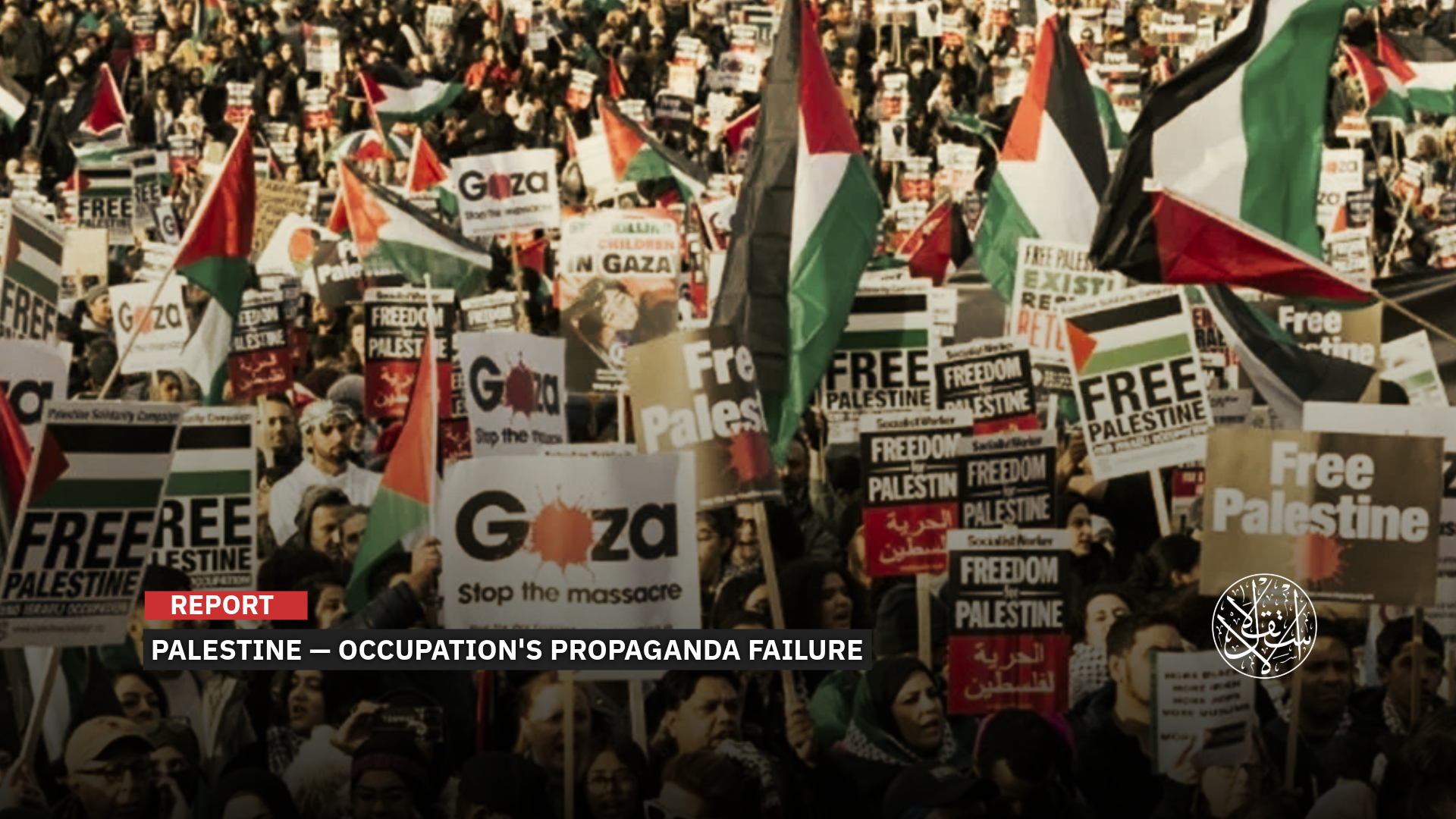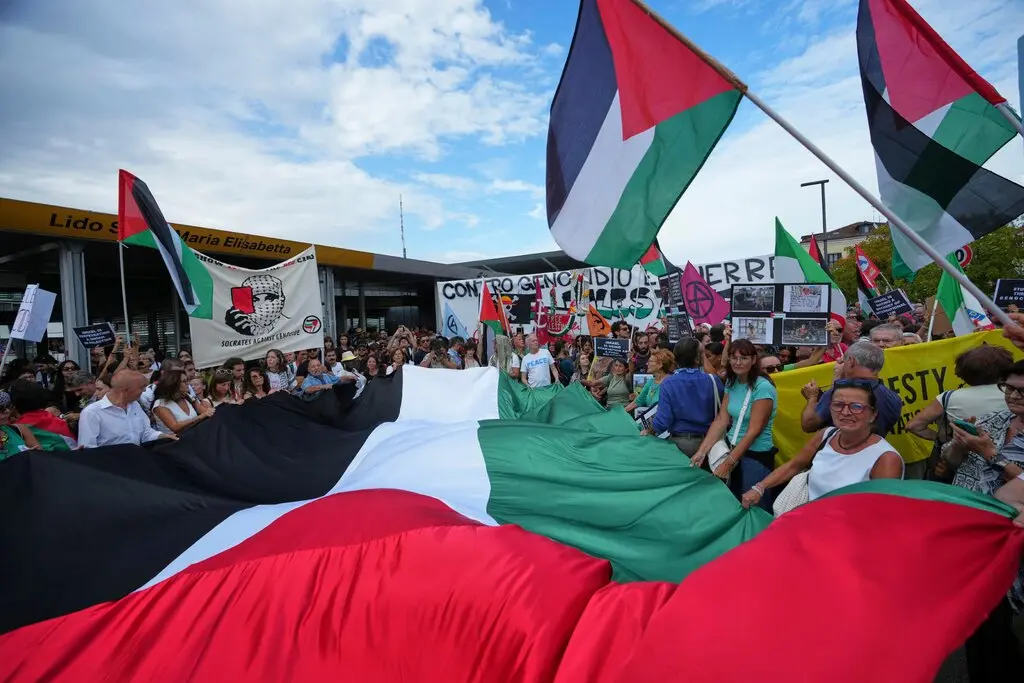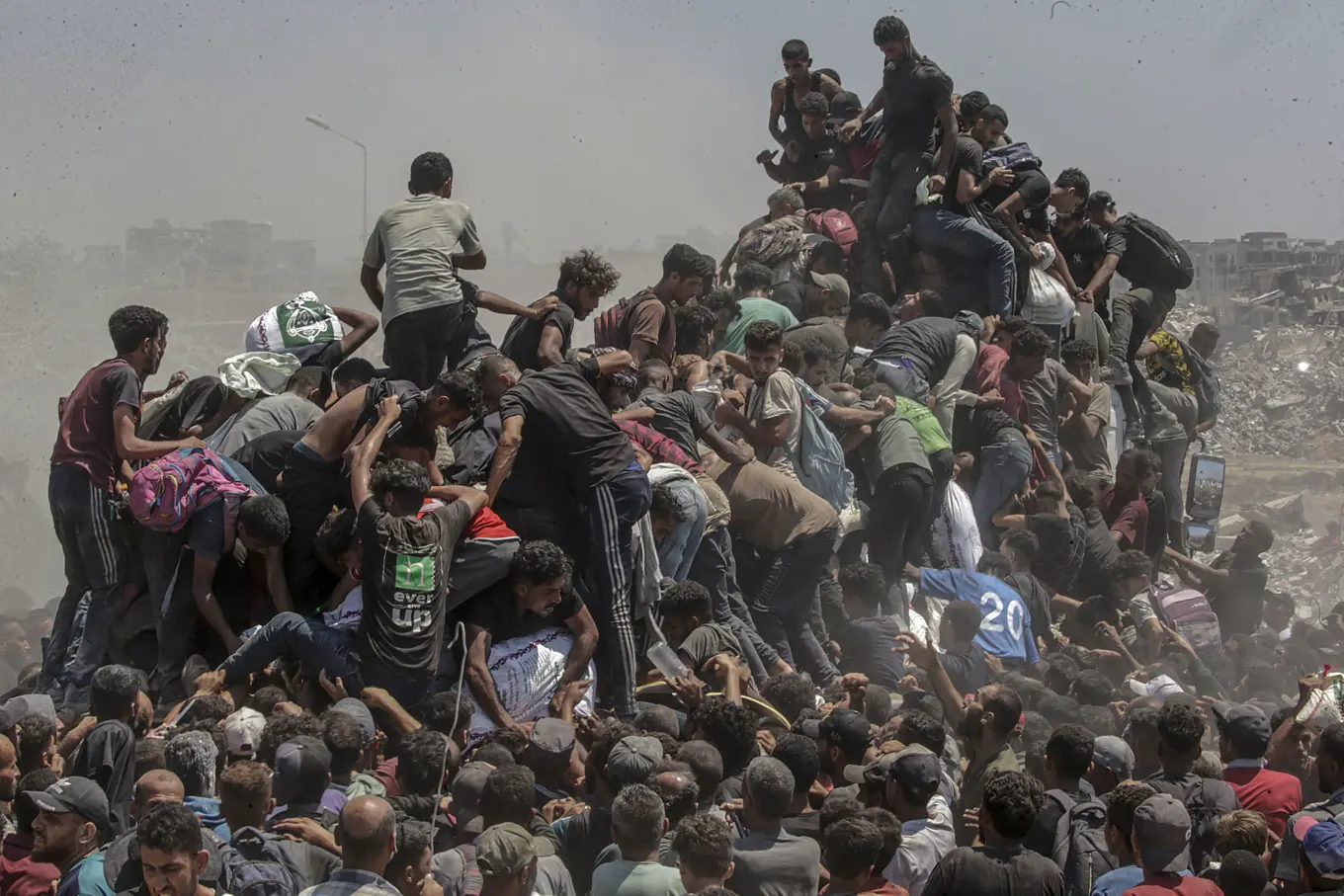Despite Billions Spent on Propaganda, ‘Israel’ Suffers Heavy Blows at the World’s Leading Arts Festivals

"Israel" is losing the battle for public opinion, undone by the unmistakable images of devastation in Gaza.
In a striking sign of “Israel’s” faltering grip on the battle for global perception, a growing number of international arts festivals have recently become platforms for political protest denouncing the mass killings and starvation unfolding in Gaza.
Images of war crimes and enforced hunger inflicted on Gazans have stirred the world’s conscience and reshaped public opinion, sparking extraordinary demonstrations and protests demanding an end to the war.
What began in the streets has now moved into cultural arenas, most recently at artistic gatherings.
Since the war began, "Tel Aviv" has sought to project a false narrative, casting itself as the victim of a Hamas attack and dismissing footage of mass killings and starvation as fabricated.
Yet such claims have failed to convince a global audience that has witnessed “Israel’s” crimes in real time for 23 months.

Cinema Condemns ‘Israel’
At the opening of the Venice Film Festival in Italy on August 30, 2025, the global event turned into a massive demonstration, with thousands taking part in solidarity with Palestinians and calling for a boycott of "Israel".
For the first time, festivalgoers succeeded in pressuring its organizers not only to bar Israeli filmmakers from attending, but also to issue a statement rejecting “Israel’s” crimes in Gaza.
The festival featured open letters condemning “Israel’s” war on Gaza, statements from 1,000 prominent figures in world cinema, and demands that invitations be rescinded for actors who had expressed support for the war.
According to the New York Times, “A pro-Palestinian demonstration during the 82nd Venice International Film Festival on Saturday diverted attention from the starry event and turned it instead toward the humanitarian crisis in the Gaza Strip.”
Around 5,000 protesters marched near the red carpet, chanting slogans such as “From the river to the sea” and “Free Palestine,” while carrying banners demanding an end to the massacres and starvation in Gaza.
They redirected the focus of the Venice Film Festival, shifting the spotlight from the red carpet to the humanitarian crisis in the enclave, through demonstrations joined by dozens of Italian political and grassroots organizations under the banner “Stop the genocide, free Palestine.”
Around 2,000 people, including actors and leading figures in cinema, signed an open letter from the Venice for Palestine collective, founded by 10 independent Italian directors, urging the festival “to be more courageous and clear in condemning the ongoing genocide in Gaza.”
They pressed organizers to withdraw invitations extended to actors Gerard Butler and Gal Gadot over their past support for "Israel", which ultimately led to both being absent from the festival following widespread criticism.
Italian actress Tecla Insolia told Corriere that excluding the Israeli actress Gadot is the bare minimum we should demand of those who openly support genocide, and it does not constitute discrimination.
The screening of The Voice of Hind Rajab on September 3, 2025, as part of the official competition, carried perhaps the strongest political weight of the festival.
The film recounts the story of a six-year-old Palestinian girl targeted by the Israeli Occupation Forces, who killed her, members of her family, and paramedics with dozens of bullets.
This prompted the Guardian to note on August 27 that "Israel" is losing the battle for public opinion because of the scale of civilian casualties and the undeniable images from Gaza.
The Washington Post also observed that "Israel" has morally isolated itself despite military and political backing from the White House.
Venice was not the only festival where the war in Gaza reshaped the agenda and left "Tel Aviv" on the losing side of the battle for perception.
At the International Documentary Film Festival Amsterdam (IDFA 2023) in December 2024, protests broke out demanding a boycott of "Israel" and divestment from companies linked to it.
At its opening, activists stormed the stage, chanting “From the river to the sea, Palestine will be free,” prompting several filmmakers to withdraw after the festival’s organizers sought to ban the protest slogan against "Israel".
The festival also screened documentaries chronicling the suffering endured by Palestinians in Gaza, spotlighting both international attention on the Palestinian cause and growing efforts to boycott "Israel".
In India, the Mumbai Film Festival (2024 to 2025) scrapped its planned “Israeli Film Festival” section after a petition signed by prominent local actors denounced “Israel’s” war.
The Carthage Film Festival in Tunisia was canceled entirely in 2023 in solidarity with Palestinians in Gaza.
The 2024 Berlin Film Festival was forced to change its official social media banner to signal support for Gaza, after artists and staff declared solidarity with the enclave and demanded a ceasefire.
The festival later removed the banner, claiming it had been the result of “hacking.”
Events at Glastonbury in June 2025, one of the UK’s biggest summer music festivals, offered another sign of shifting sentiment, as some performances became platforms for political chants from audiences, including calls for the Israeli Occupation Forces to be held accountable for mass killings of Palestinians.
During a set by the English duo Bob Vylan, the crowd chanted slogans such as “Death to the Israeli Occupation Forces” and “Free Palestine.”
The performance was broadcast live by the BBC on its iPlayer platform, sparking uproar.
Videos also circulated showing members of the band chanting “Long live Hamas, long live Hezbollah.”

The Battle for Public Perception
"Israel" has long been accustomed to winning the “narrative war” through Western media and its outward-facing propaganda campaigns, known as hasbara.
But in the latest Gaza war, images of killings and starvation have outstripped “Israel’s” false messaging, proving more powerful than political rhetoric and pushing global public opinion toward the Palestinians more than ever before.
Many Western media analyses have concluded that "Israel" is losing the “battle of images” or the “war for public opinion” as scenes of mass killings and devastation in Gaza eclipse its vast propaganda apparatus.
They noted that "Israel" is facing a rapid erosion of support worldwide, with official propaganda, or hasbara in Hebrew, unable to compete with daily footage of famine, destruction, and civilian casualties beamed across the globe, leading to the collapse of "Tel Aviv"’s narrative.
"Tel Aviv" has itself acknowledged the problem, with Benjamin Netanyahu’s government allocating an additional $150 million in its budget to fund what it calls “campaigns to explain “Israel’s” position to the world.”
According to the Times of Israel on December 29, 2024, this figure amounts to 20 times the budget of previous years.
"Israeli foreign minister Gideon Sa’ar described these propaganda efforts as part of a “war of consciousness,” stressing that the new funds would be used for international media campaigns, intensified activity on social media platforms, and tailored programs in American universities “to counter the growing wave of solidarity with Palestinians.”
Yet the results so far have been the opposite. Despite billions poured into hasbara campaigns, multiple reports have shown that “Israel’s” messaging has lost traction globally.
Hasbara has focused on polishing “Tel Aviv’s” image abroad, projecting its official narratives through the media, universities, and think tanks, and justifying its “actions” under the labels of “counterterrorism” and “Israel’s right to self-defense.”
The tools of hasbara include official spokespeople such as Avichay Adraee in Arabic, English-speaking representatives, and organized online troll armies tasked with amplifying the Israeli narrative on social media.
Lobby groups also play a role, most prominently AIPAC in the United States, which promotes “Israel’s” line and shapes policy, alongside organizing “Israel experience” trips for journalists and politicians, including members of parliaments around the world.
Other elements of “Israel’s” propaganda machine involve the exploitation of art and culture, attempting to burnish its image through cinema, music festivals, or by promoting the country as a hub of “technology and innovation,” an image that has crumbled in recent film and music events.
Matt Lieb, host of the Bad Hasbara podcast, explained in a video on X that “Israel’s” strategy faces a fundamental crisis.
“You can convince Western governments to back 'Israel', but you cannot convince ordinary people who see the massacres with their own eyes,” he said.
“The more 'Israel' tries to justify atrocities, the clearer it becomes to audiences that this is nothing but propaganda,” he added.
Lieb described the "Israeli government’s reliance on celebrities and influencers as futile, since people do not build their moral or political convictions on what those figures say.”
The Swiss independent outlet NZZ warned on August 29, 2025, that “Israel faces the risk of losing the propaganda war,” noting its growing difficulty in promoting its narrative of events in Gaza.
It explained that Israeli Occupation “is under pressure in the propaganda war over Gaza, because images of suffering and devastation have transformed its image from that of a ‘small threatened state’ into an ‘arrogant aggressor.’”
Former U.S. president Donald Trump echoed this in an interview with the Daily Caller in early September 2025, where he cautioned that the continuation of the war in Gaza was damaging “Israel’s” image, stressing that it is losing the global battle for public opinion, the so-called “image war,” in ways that would harm its long-term strategic interests.
“Although Israel is advancing militarily in Gaza, it is losing the public relations battle,” Trump said, “and they will have to end the war; no doubt it is hurting them.”
He added that while "Israel" once had the strongest lobby he had ever seen in American politics, it no longer carries the same weight, having weakened significantly in recent years after once enjoying near-total control over Congress.
The failure in the “image war” has also been reflected in the erosion of official Western support, following the decline in popular backing, with more than 15 Western countries announcing plans to recognize the state of Palestine in September 2025.
This came on the heels of growing waves of academic, cultural, and sporting boycotts of "Israel", as well as mounting criticism of numerous congressional candidates during their campaigns, where opponents accused them of taking money from "Tel Aviv".

Factors Behind the Loss
Dr. Ahmed Labib, an expert in media and development communication, argues that the most significant outcome of the “battle of narratives” has been “Israel’s” loss of the propaganda it had long relied on, portraying itself as an “oasis of democracy, freedom, and human rights” in the Arab region.
“Zionist barbarism, and the authoritarian regimes that support it, have exposed the falsity of the image long promoted by Israeli media and its allied lobby groups, presenting Israel as the first democracy in what is called the greater Middle East,” He told Al-Estiklal.
He pointed out that this carefully constructed image of "Israel", cultivated over decades to support attempts at integration and normalization with what he called a usurping entity, has now collapsed under the weight of revelations of war crimes, mass killings, and starvation in Gaza.
“The first to bring down this false narrative were European and Western societies, and the civil movements that channeled their peaceful protests, after they were horrified by the wreckage of a brutal military machine seeking to annihilate a people who, on October 7, 2023, chose to resist in defense of their survival and historic rights,” Labib noted.
He added that cinema, art, and cultural freedoms thrive only in conditions of liberty, which explains why global filmmakers, through their features and shorts, expressed the spirit of their societies’ movements, in stark contrast to much of the Arab world where oppressive regimes stifle civic expression and protests remain muted.
According to Labib, the winner in the narrative of Operation al-Aqsa Flood, across the Global South, is the Palestinian people, while the loser is the war and those who back it.
“The history of liberation struggles confirms the counter-narrative,” he said, “that free peoples reclaim their lands with their own hands, not through others, and all that is required is to support Palestinians and their steadfastness in the face of Zionist barbarity.”
Western reports have likewise pointed to the daily images from Gaza, children under the rubble, destroyed hospitals, famine, and the unfolding humanitarian catastrophe featured prominently in global news bulletins, as key factors in “Israel’s” loss of the image war.
They stressed that these images contradict “Israel’s” claim of “self-defense,” especially in an era where alternative media thrives.
Social media platforms have broken the monopoly of traditional Western outlets, undermining the false picture conveyed by Israeli media and its allies.
In response, "Israel" has intensified its targeting of journalists in Gaza in an attempt to halt the flow of harrowing images, with more than 265 reporters killed during the war so far.
Another factor in “Israel’s” defeat in the battle of perception has been the engagement of Western public opinion with Gaza, expressed in student demonstrations and mass protests across the streets of the U.S. and Europe, which in turn pressured universities and unions to push for boycotts of "Tel Aviv".
The Swiss outlet NZZ, which expressed sympathy for "Tel Aviv", identified four factors driving “Israel’s” defeat in the public relations war.
“While Israel is a technologically superior state with a functioning military, Gaza is a devastated area perceived as a symbol of powerlessness. This structural inequality strikes many observers as a moral disparity.”
“The emotionalization of reporting: Modern media consumption is heavily image-driven. Images of dead children elicit empathy – even when it is not clear who is responsible for their deaths.”
According to NZZ, “The strategic weakness in Israel's public communication efforts: While Hamas deliberately relies on viral emotion, Israel often tries to explain rather than convince. However, the battle for attention in this case is not measured in arguments, but in impact.”
“The zeitgeist: In an increasingly polarized, identity-driven world where oppression and resistance are often thought of in fixed patterns, Israel finds it difficult to position itself as a country under attack. To many people, Israel is not the victim, but the aggressor – regardless of the events leading up to Oct. 7. This dynamic is reinforced by social networks, where opinions and narratives become perceived reality through repetition.”
Regardless of the events of October 7, it is widely perceived as the aggressor.
Sources
- Foreign Ministry to receive massive budget for public diplomacy abroad
- Activists hope to shift Venice film festival focus on to crisis in Gaza
- Pro-Palestinian Protesters Raise Gaza War at the Venice Film Festival
- Pro-Palestine protesters storm Venice Film Festival shouting controversial chant disrupting star-studded event
- Israel at risk of losing the propaganda war
- Trump Acknowledges Israel Is Losing Control Of Congress










